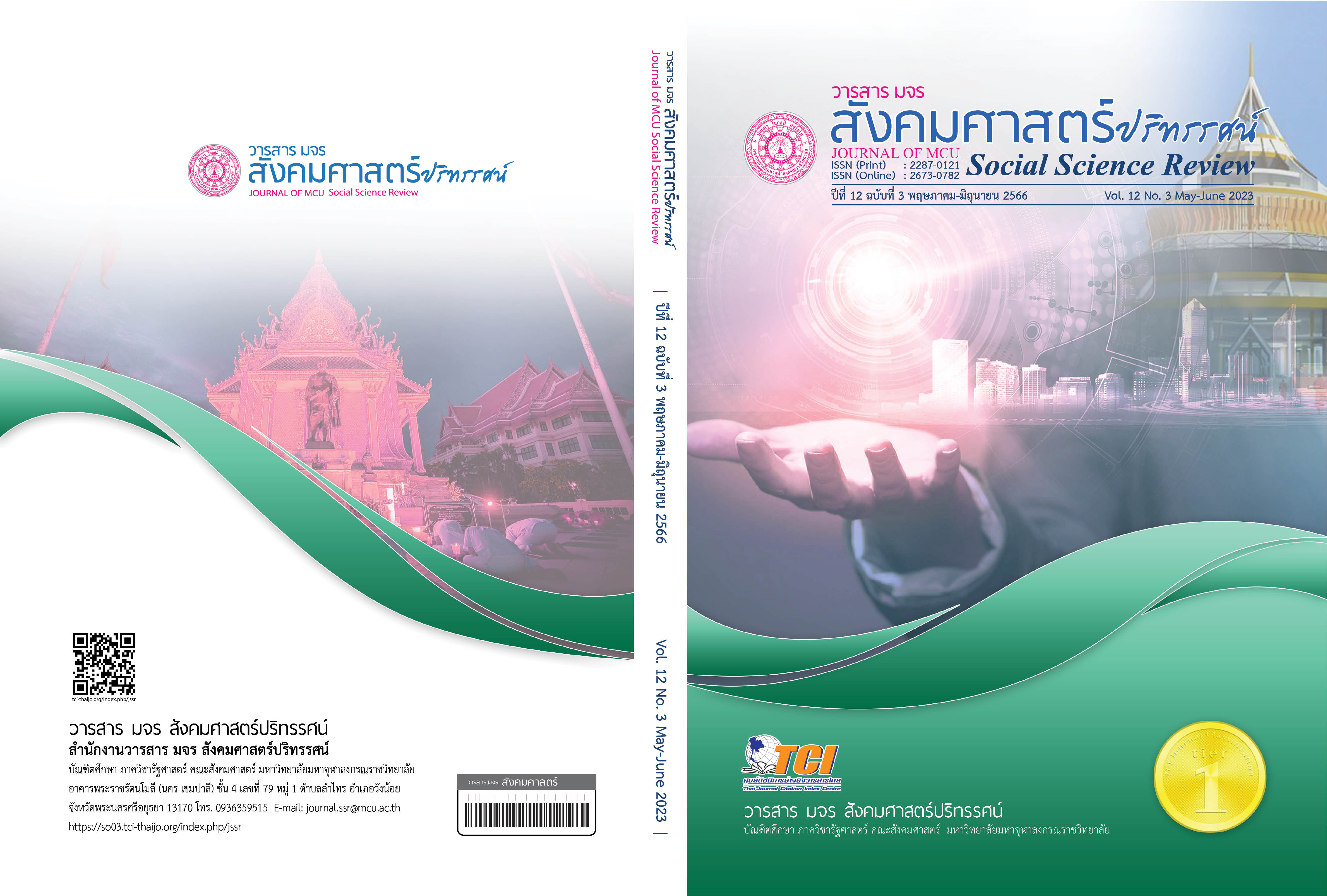แนวทางการกำหนดนโยบายส่งเสริมพฤติกรรมการรายงานข่าว ผ่านเฟซบุ๊กไลฟ์อย่างมีจริยธรรมของนักข่าวพลเมือง
คำสำคัญ:
พฤติกรรมการรายงานข่าว, เฟซบุ๊กไลฟ์, นักข่าวพลเมืองบทคัดย่อ
บทความวิจัยนี้มีวัตถุประสงค์เพื่อพัฒนาแนวทางการกำหนดนโยบายส่งเสริมพฤติกรรมการรายงานข่าวผ่านเฟซบุ๊กไลฟ์อย่างมีจริยธรรมของนักข่าวพลเมือง โดยใช้วิธีการวิจัยอนาคตแบบใช้เทคนิควิธี EDFR (Ethnographic Delphi Futures Research) ผู้ให้ข้อมูลหลักเป็นผู้เชี่ยวชาญที่มีบทบาทและเกี่ยวข้องกับพฤติกรรมการรายงานข่าวผ่านเฟซบุ๊กไลฟ์ของนักข่าวพลเมือง โดยผู้วิจัยคัดเลือกผู้เชี่ยวชาญแบบเจาะจงจำนวนรวมทั้งสิ้น 18 คน แบ่งกลุ่มผู้เชี่ยวชาญออกเป็น 3 กลุ่ม ดังนี้ 1. กลุ่มที่มีบทบาทอำนาจหน้าที่ในการกำหนดนโยบาย จำนวน 6 คน 2. กลุ่มที่ปฏิบัติงานหรือมีพฤติกรรมการรายงานข่าวผ่านเฟซบุ๊กไลฟ์ จำนวน 6 คนและ
3. กลุ่มนักวิชาการด้านต่าง ๆ ที่เกี่ยวข้อง จำนวน 6 คน
ผลการวิจัยพบว่า แนวทางการกำหนดนโยบายส่งเสริมพฤติกรรมการรายงานข่าวผ่านเฟซบุ๊กไลฟ์อย่างมีจริยธรรมของนักข่าวพลเมืองในอนาคต มี 6 แนวทางที่สำคัญ ได้แก่ 1. การสร้างเครือข่ายเฝ้าระวังการกระทำผิดจริยธรรม 2. ผู้ให้บริการแพลตฟอร์มในสื่อออนไลน์ใช้เทคโนโลยีตรวจสอบ 3. การจัดกิจกรรมถอดบทเรียนเพื่อแลกเปลี่ยนเรียนรู้ร่วมกัน 4. การจัดอบรม workshop หรือหลักสูตรสำหรับนักข่าวพลเมือง 5. การจัดทำใบรับรอง ใบประกาศหรือบัตรสมาชิกสำหรับนักข่าวพลเมือง 6. ผู้มีส่วนได้ส่วนเสียหาแนวทางปฏิบัติร่วมกันเพื่อจัดทำคู่มือจริยธรรม โดยมีกลุ่มผู้เกี่ยวข้องหลัก 4 กลุ่ม ได้แก่ 1. ประชาชน กลุ่มภาคประชาสังคม
2. ผู้ให้บริการแพลตฟอร์มในสื่อสังคมออนไลน์ 3. องค์กรวิชาชีพสื่อและ 4. หน่วยงานกำกับดูแลภาครัฐ ซึ่งแต่ละกลุ่มมีหน้าที่ความรับผิดชอบในการดำเนินนโยบายแตกต่างกัน
เอกสารอ้างอิง
การดา ร่วมพุ่ม. (2557). สื่อมวลชนกับการรายงานข่าวสิทธิเด็ก. วารสารนิเทศศาสตร์ธุรกิจบัณฑิต, 8(1), 31-53.
คณาธิป ทองรวีวงศ์. (2558). สิทธิในการสื่อสารข้อมูลออนไลน์โดยนิรนามของสื่อพลเมือง. วารสารนิติสังคมศาสตร์, 8(2), 72-128.
เทียนทิพย์ เดียวกี่. (2559). จริยธรรมและจรรยาบรรณสื่อในการนำข่าวยุคดิจิตอล. วารสารการสื่อสารและการจัดการนิด้า, 2(2), 125–143.
พรรณี อมรวิพุธพานิช. (2562). การกำหนดแนวทางปฏิบัติทางจริยธรรมสำหรับนักข่าวพลเมืองยุคสื่อสังคมออนไลน์. วารสารนิเทศศาสตรปริทัศน์, 23(1), 270-283.
ศิริวรรณ อนันต์โท. (2558). จริยธรรมวิชาชีพสื่อมวลชนการศึกษาในประเทศไทยและภูมิภาคอาเซียน. วารสารอิศราปริทัศน์, 4(6), 7–25.
สภาการสื่อมวลชนแห่งชาติ. (2565). เหตุสะเทือนขวัญ “หนองบัวลำภู” สื่อหลักส่วนน้อยยังหลุดกรอบ ย้ำเติมความรู้สื่อรุ่นใหม่. สืบค้น 12 ตุลาคม 2565, จาก https://www.presscouncil.or.th/8228
สุทธิชัย หยุ่น. (2555). อนาคตของข่าว. สมุทรปราการ: บริษัท ดับบลิวพีเอส ประเทศไทย จำกัด.
สุรพงษ์ โสธนะเสถียร. (2557). ทฤษฎีการสื่อสาร. กรุงเทพฯ: โรงพิมพ์ระเบียงทอง.
Barnes, C. (2012). Citizen journalism VS traditional journalism. Caribbean Quarterly, 58 (2-3), 16-27.
Bowman, S., & Willis, C. (2003). We media: How audiences are shaping the future of news and information. Retrieved October 12, 2022, from www.hypergene.net.
Linderud, A. H. (2009). Effects of Codes of Ethics in Media a Comparative Analysis of Hawaii Journalists and Norwegian Journalists Hawaii. Pacific University, ProQuest Dissertations Publishing. Retrieved October 12, 2022, from search.proquest.com.
Macmillan, T. (1971). The Delphi Technique. Retrieved October 12, 2022, from files.eric.ed.gov.
ดาวน์โหลด
เผยแพร่แล้ว
รูปแบบการอ้างอิง
ฉบับ
ประเภทบทความ
สัญญาอนุญาต
ลิขสิทธิ์ (c) 2023 วารสาร มจร สังคมศาสตร์ปริทรรศน์

อนุญาตภายใต้เงื่อนไข Creative Commons Attribution-NonCommercial-NoDerivatives 4.0 International License.
เพื่อให้เป็นไปตามกฎหมายลิขสิทธิ์ ผู้นิพนธ์ทุกท่านต้องลงลายมือชื่อในแบบฟอร์มใบมอบลิขสิทธิ์บทความให้แก่วารสารฯ พร้อมกับบทความต้นฉบับที่ได้แก้ไขครั้งสุดท้าย นอกจากนี้ ผู้นิพนธ์ทุกท่านต้องยืนยันว่าบทความต้นฉบับที่ส่งมาตีพิมพ์นั้น ได้ส่งมาตีพิมพ์เฉพาะในวารสาร มจร สังคมศาสตร์ปริทรรศน์ เพียงแห่งเดียวเท่านั้น หากมีการใช้ภาพหรือตารางหรือเนื้อหาอื่นๆ ของผู้นิพนธ์อื่นที่ปรากฏในสิ่งตีพิมพ์อื่นมาแล้ว ผู้นิพนธ์ต้องขออนุญาตเจ้าของลิขสิทธิ์ก่อน พร้อมทั้งแสดงหนังสือที่ได้รับการยินยอมต่อบรรณาธิการ ก่อนที่บทความจะได้รับการตีพิมพ์ หากไม่เป็นไปตามข้อกำหนดเบื้องต้น ทางวารสารจะถอดบทความของท่านออกโดยไม่มีข้อยกเว้นใดๆ ทั้งสิ้น





